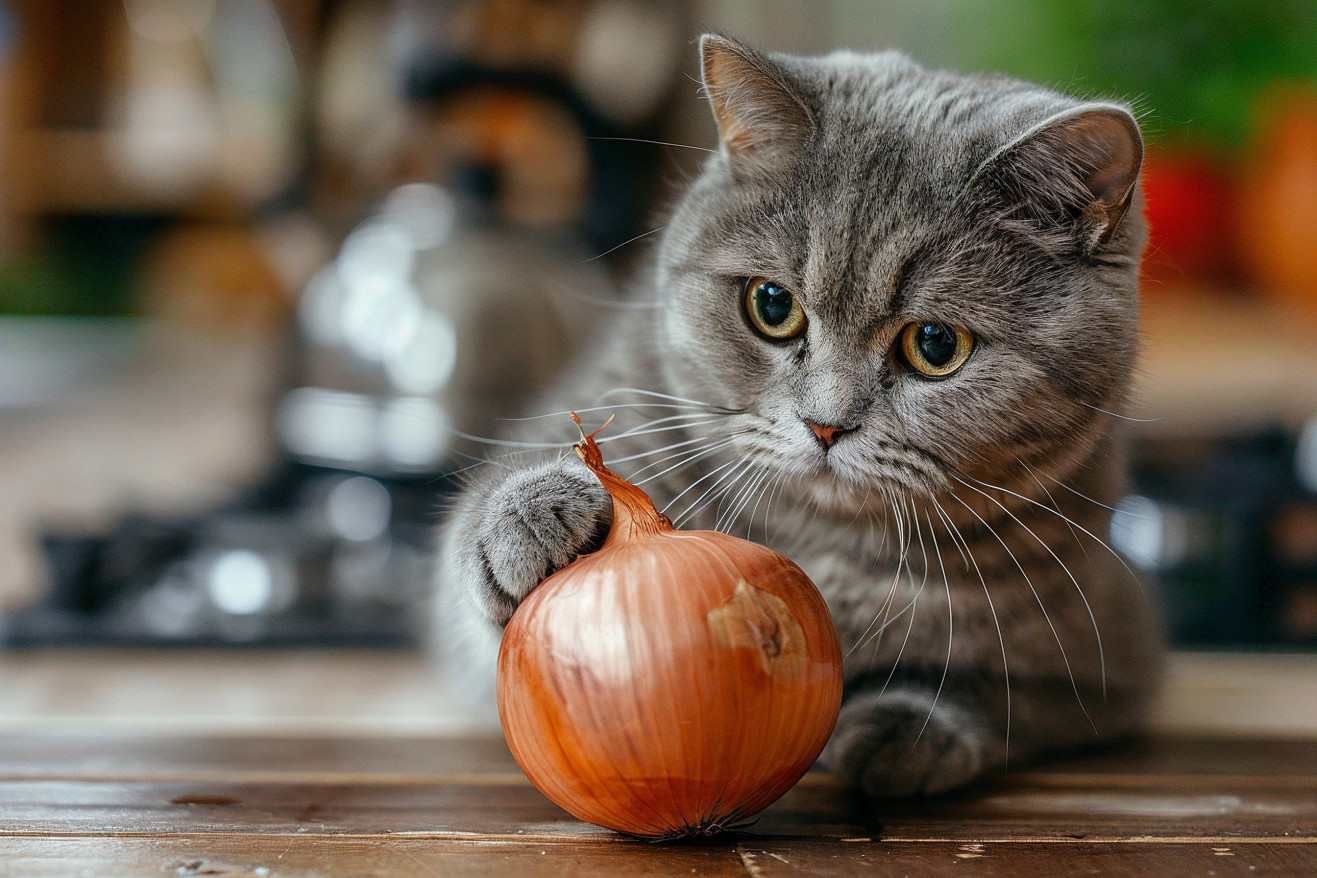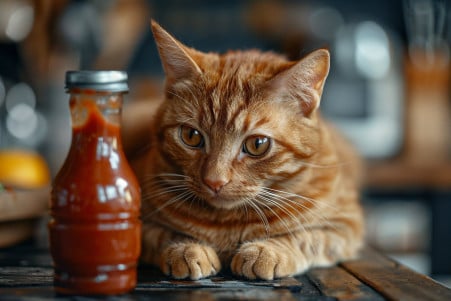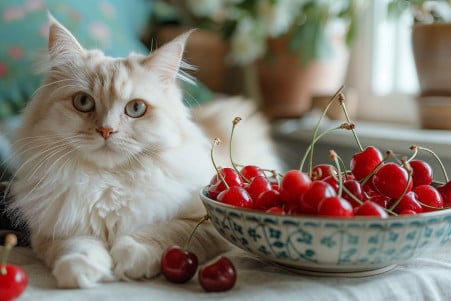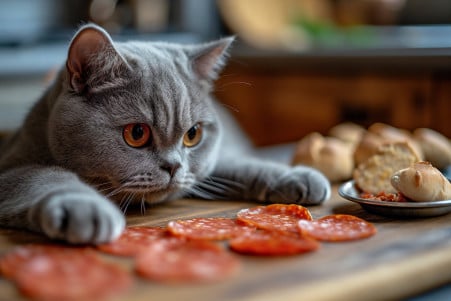Can Cats Eat Onions? Understanding the Risks of Onion Toxicity in Felines
12 March 2024 • Updated 11 March 2024

Onions, a common ingredient in many human meals, are a danger to our feline friends. Cats can’t eat onions, as even small amounts of them contain N-propyl disulfide, which can lead to the destruction of a cat’s red blood cells and result in anemia.
This anemia can be fatal and is characterized by symptoms such as weakness, vomiting, and panting. If a cat eats onions, it’s important to seek immediate medical attention from a veterinarian.
This article will take a deep dive into veterinary studies and toxicology research to explain the serious impact onions can have on cats. We’ll also look at the details of feline biology and nutrition to explain why certain compounds in onions are poisonous to cats and how their bodies’ handling of these compounds leads to toxicity.
This information will give cat owners a scientific understanding of the dangers of onion toxicity in cats and help them know what to do to prevent it and how to respond if it happens.
Can cats eat onions?
The Hidden Danger of Onions: Onion Toxicity in Cats
The compound in onions that is toxic to cats is called N-propyl disulfide. According to PetMD, this compound causes oxidative damage to a cat’s red blood cells, leading to their destruction.
This is known as hemolysis and can lead to life-threatening anemia. DVM360 explains that the compound is more toxic to a cat’s red blood cells than it is to those of other animals, and this is due to the unique structure of a cat’s red blood cells.
The health effects of oxidative damage are both serious and far-reaching. They can include everything from a decreased ability to transport oxygen to other parts of the body to damage to other organs, such as the liver and kidneys.
DVM360 describes a case where a cat that had ingested even a small amount of onions showed signs of oxidative damage, including symptoms like lethargy and gas, and tests showed that Heinz bodies, which are a sign of oxidative damage, were present in almost every red blood cell.
Both PetMD and DVM360 explain that when veterinarians intervene quickly, the prognosis for cats that have ingested onions is often good. However, there is still a risk of long-term damage, especially if the cat has ingested a large amount of onions or if treatment is delayed. Knowing this information can help cat owners make the best decisions to protect their pets.
How to Make Sure Your Cat Is Getting the Right Nutrients
Cats are obligate carnivores, which means that they need a diet that is primarily made up of meat. This is due to their ancestors’ diet, which was rich in animal-based nutrients. VCA Animal Hospitals notes that cats need nutrients that are found in animal tissue, such as certain essential fatty acids and vitamins, in forms that are not found in plant tissue and are biologically available to cats.
In addition, their desert heritage means that cats have evolved to be very efficient at conserving water, so they get most of their water from their food rather than drinking it.
Of the essential nutrients that cats need to get from their food, protein is the most important. PetMD points out that cats have evolved to use protein as their primary source of energy, which is different from humans and dogs, who primarily use carbohydrates.
This adaptation is so important that cats need more essential amino acids, like taurine and arginine, than any other mammal, which means that high-quality animal protein is essential to their diet.
While it’s easy to see that feeding your cat onions, which are safe for humans but toxic to cats, is a clear example of a dietary hazard, it’s important to know why.
Onions have compounds that cats’ bodies can’t break down, which can lead to serious health issues.
This is important for cat owners to know because cats’ digestive systems are designed to process animal-based nutrients, not plant-based ones, and this can lead to a number of dietary hazards. By understanding this, cat owners can make better choices about what to feed their cats, which can help them stay healthier and avoid potential trips to the vet.
What to Do If You Think Your Cat Ate Onions
If you think your cat has eaten onions, it is important to act quickly. The first thing you should do is call your vet or the Animal Poison Control Center, as recommended by the PDSA and ASPCA.
The sooner you can get your cat in for treatment, the better the chances of a full recovery. Do not try to induce vomiting or treat your cat at home, as this can be dangerous and may make things worse.
According to the PDSA, treatment for onion poisoning in cats may include the administration of activated charcoal to absorb the toxins in the stomach. In more severe cases, treatment may also include supportive care such as fluid therapy, antiemetic drugs, and blood transfusions. After treatment, your vet will likely continue to monitor your cat for symptoms and may perform additional blood tests to check on their condition.
If your cat receives prompt treatment, they are likely to recover from onion poisoning with no long-term effects. However, it is important to make sure that your cat doesn’t have another run-in with onions in the future. After your cat has been treated for onion poisoning, make sure that your home is safe by keeping onions and onion-containing foods out of your cat’s reach.
Protecting Your Cat: How to Prevent Onion Toxicity
First and foremost, protect your cat from onion toxicity by taking steps to prevent the condition at home. This includes keeping onions and other toxic foods out of your cat’s reach by using childproof locks on cabinets and securing food in the kitchen, according to Hill’s Pet. This is especially important during the holidays or other times when food may be more accessible.
To help reduce the risk of your cat accidentally eating something they shouldn’t, offer them safe options. While you may use onions to flavor your food, your cat can enjoy treats that are made specifically for their carnivorous diet. Talk to your vet about options that will meet your cat’s nutritional needs as an obligate carnivore, according to the RSPCA.
Prevention also involves awareness and education. Make sure you know which foods are toxic to your cat, including chocolate, caffeine, and certain fruits. Make sure everyone in your household is aware of these risks so that they can help keep your cat safe.
Finally, regular visits to your vet will ensure that you get dietary recommendations that are tailored to your cat’s needs. This will help you keep your beloved pet healthy, according to the Association of American Feed Control Officials and the American Animal Hospital Association. By following these steps, you’ll be able to make sure that your cat is in a safe environment that supports their health and well-being.
A Note on Feline Dietary Safety: The Dangers of Onions
In wrapping up our discussion of feline dietary safety, it’s clear that onions are a major concern. The oxidative damage to red blood cells that results from onion consumption can lead to anemia and even death in cats, according to PetMD and the Merck Veterinary Manual. A case study from DVM360 drives home the point of how serious and time-sensitive onion toxicity can be, and the importance of immediate veterinary care.
It’s up to us as pet parents to make sure we’re doing everything we can to protect our cats from these dangers, which means keeping onions and other toxic foods away from them and getting them to the vet as soon as possible if they do get into something they shouldn’t.
This includes understanding the nutritional needs of cats as obligate carnivores so that we can help prevent accidental toxicities and keep them healthy.
For more information on feline nutrition and toxicity, check out the ASPCA Animal Poison Control Center and PetMD. When it comes to taking care of our pets, knowledge is not only power, it’s a key part of keeping our animal companions safe and healthy.


